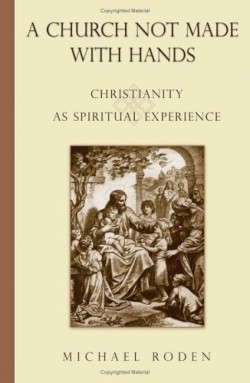A Church Not Made With Hands
Christianity as Spiritual Experience
So what is it about church that makes some people feel like they’re at the periphery of something vital, and the vital thing is somewhere else? According to this book, the answer lies in the tendency for religious practice to degenerate over time into mere dogma and ritual. Secular power becomes more valued than experience of the sacred, and the essential spiritual kernel of true religious experience gets left behind. The author writes that the true experiential element of religion, the mystical and spiritual core of scripture, is the part most easily ignored and jettisoned. However, Roden says, the mystical life force of Christianity is there for all to find, if the scripture is read wisely.
A professional counselor in Columbus, Ohio, Roden has written two previously self-published books, Jesus and Ourselves and Songs of the Morning: Meditations for Healing and Self-Knowledge. Here, he asserts that nothing is lacking in the received version of the Bible, as it is. What is needed is not more texts, not more discoveries of long-lost scrolls, but a better, less confining reading of the current text. Roden’s emphasis is on the spiritual, not the literal and legalistic interpretations that have ossified the essential mystical experience that he finds in Jesus’ message.
Roden convincingly cites hundreds of biblical passages to support his thesis that the living Word of the Bible is a seed, ready to sprout in the good soil of careful understanding. He draws on scholarly works from the likes of Paul Tillich and Northrop Frye as well as the mystical works of Meister Eckhart and Origen. The bulk of his exposition, however, is based squarely on scripture, and what he describes is a matrix of interrelated doctrine that has tended to be misread or ignored over time.
What is most refreshing about Roden’s book, besides its erudition, is its willingness to go beyond the limits of literalism to search for a deeper core of meaning in the Bible. For example, Roden interprets the Adam and Eve story as an allegory of the fall from spirit to flesh, or, as Tillich states, a transition from essence to existence. “Physical creation and the fall are so closely bound together,” writes Roden, “that it seems likely that they are really two parts of one motion, scenes of the same basic act.”
There is sometimes a certain circularity in parts of Roden’s book—a lack of narrative force—but it is nonetheless exciting to be reminded of the depth of spirit inherent in biblical scripture. A Church Not Made With Hands is an empowering book.
Reviewed by
Mark Smith
Disclosure: This article is not an endorsement, but a review. The publisher of this book provided free copies of the book to have their book reviewed by a professional reviewer. No fee was paid by the publisher for this review. Foreword Reviews only recommends books that we love. Foreword Magazine, Inc. is disclosing this in accordance with the Federal Trade Commission’s 16 CFR, Part 255.

